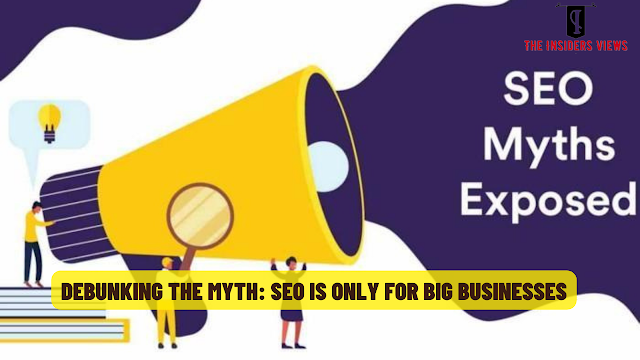Debunking the Myth: SEO is Only for Big Businesses
In our fast-paced digital world, search engine optimization (SEO) has become a crucial element for businesses aiming to establish a strong online presence. However, there is a common misconception that SEO is only effective for big companies with ample resources and budgets. In this article, we will debunk this myth and shed light on how SEO can benefit businesses of all sizes. So, let's dive in and explore the truth behind the myth that "SEO is Only for Big Businesses."
 |
| Debunking the Myth: SEO is Only for Big Businesses |
The Importance of SEO for Small and Medium-Sized Businesses
Small and medium-sized businesses (SMBs) often operate on tighter budgets and face fierce competition in the online marketplace. Therefore, it is essential for them to leverage every opportunity available to increase their visibility and attract potential customers. This is where SEO plays a vital role. By optimizing their websites and content, SMBs can enhance their online presence and level the playing field against larger competitors.
Increased Online Visibility
One of the primary objectives of SEO is to improve a website's visibility in search engine results pages (SERPs). Contrary to the myth, SEO is not limited to big businesses. In fact, smaller businesses can greatly benefit from SEO strategies to rank higher in search results. By targeting relevant keywords and optimizing their website's structure, content, and meta tags, SMBs can increase their organic visibility and attract valuable traffic.
Enhanced User Experience
A common misconception is that SEO is solely focused on search engines. However, the truth is that SEO goes hand in hand with providing a positive user experience. Search engines favor websites that are user-friendly, fast-loading, and mobile-responsive. Implementing SEO techniques helps SMBs create websites that are easy to navigate, engaging, and optimized for different devices. This, in turn, improves user satisfaction, reduces bounce rates, and increases the chances of conversions.
Targeted Audience Reach
SEO allows businesses to target specific audiences and demographics effectively. With the right keyword research and content optimization, SMBs can reach their target audience with precision. By understanding their customers' needs and tailoring their SEO strategies accordingly, smaller businesses can attract relevant visitors who are more likely to convert into customers. This targeted approach gives SMBs an edge in the competitive digital landscape.
Cost-Effectiveness
Contrary to the belief that SEO is an expensive endeavor, it can actually be a cost-effective marketing strategy for SMBs. While big businesses may have larger marketing budgets, SMBs can achieve significant results by focusing on local SEO and long-tail keywords. By optimizing their website for local searches and targeting specific, niche keywords, SMBs can attract high-quality traffic without breaking the bank.
Building Credibility and Trust
Establishing credibility and trust is crucial for businesses of all sizes, and SEO can play a pivotal role in achieving this. When a website ranks high in search results, it signals to users that it is a reliable and trustworthy source. This perception positively impacts a business's reputation and increases its credibility among potential customers. By consistently implementing SEO strategies, SMBs can build a solid online presence and earn the trust of their target audience.
Debunking the Myth: SEO is Only for Big Businesses
Despite the myth that SEO is exclusive to big businesses, the reality is quite the opposite. SEO is a versatile and scalable marketing tool that can be tailored to the unique needs of any business, regardless of its size or industry. Let's debunk this myth once and for all by addressing some frequently asked questions about SEO for small and medium-sized businesses.
FAQs about SEO for Small and Medium-Sized Businesses
1. Can SMBs compete with larger businesses in terms of SEO?
Absolutely! While larger businesses may have more resources at their disposal, SEO is not solely reliant on budget. Small and medium-sized businesses can compete by focusing on their unique strengths, targeting niche markets, and implementing effective SEO strategies. By conducting thorough keyword research, creating high-quality content, and optimizing their websites, SMBs can increase their visibility and compete with larger businesses in search engine rankings.
2. Is SEO only effective for e-commerce businesses?
Not at all. While e-commerce businesses can benefit greatly from SEO, it is not limited to this industry. SEO is applicable to businesses across various sectors, including service-based industries, local businesses, and B2B companies. Whether it's a plumbing service, a law firm, or a consulting agency, implementing SEO strategies can help businesses increase their online visibility, attract relevant traffic, and generate leads.
3. How long does it take to see results from SEO efforts?
SEO is a long-term strategy that requires patience and consistency. It's important to understand that results may not be immediate, especially for newer websites or competitive industries. It typically takes several months to see noticeable improvements in search rankings and organic traffic. However, by consistently implementing SEO best practices, businesses can gradually climb the search engine rankings and reap the benefits of increased visibility and traffic.
4. Is it necessary to hire an SEO agency or professional?
While it's not mandatory to hire an SEO agency or professional, it can be highly beneficial, especially for SMBs with limited knowledge or resources. SEO is a complex field that requires expertise and continuous learning. By outsourcing their SEO efforts to experienced professionals, businesses can ensure that their strategies are implemented effectively and stay up-to-date with the ever-changing search engine algorithms.
5. What are some basic SEO techniques that SMBs can implement?
There are several basic SEO techniques that SMBs can implement to improve their online presence:
- Keyword research: Identify relevant keywords and incorporate them strategically into website content, headings, and meta tags.
- On-page optimization: Optimize website elements such as titles, meta descriptions, URLs, and image alt tags.
- Content creation: Develop high-quality, informative, and engaging content that resonates with the target audience.
- Link building: Build relationships with other reputable websites to earn backlinks, which can improve search engine rankings.
- Local SEO: Optimize the website for local searches by including location-specific keywords and creating a Google My Business profile.
6. Can social media impact SEO efforts for SMBs?
Yes, social media can indirectly impact SEO efforts for SMBs. While social media signals themselves may not have a direct impact on search engine rankings, they can contribute to increased brand visibility, engagement, and traffic. By sharing valuable content, building a strong social media presence, and encouraging social sharing, SMBs can enhance their online visibility and attract potential customers who may subsequently engage with their website and content, leading to improved SEO performance.
Conclusion
In conclusion, the myth that "SEO is Only for Big Businesses" is far from the truth. SEO is a powerful tool that can benefit businesses of all sizes, including small and medium-sized businesses. By leveraging SEO strategies effectively, SMBs can increase their online visibility, attract targeted traffic, and compete with larger businesses in the digital landscape. It is crucial for SMBs to understand that SEO is a long-term investment that requires consistency and adaptation to stay ahead. So, debunk the myth and embrace SEO as a vital component of your business's success.






Post a Comment